'Buy it, steal it, just feel it. I don't care,' frontman Tyson Ritter says of AAR's new album, Kids in the Street.
By James Montgomery

Tyson Ritter of All American Rejects
Photo: MTV News
When the All-American Rejects returned in March with Kids in the Street, expectations were high. After all, it was the follow-up to 2008's When the World Comes Down — an album that continued their string of crossover successes thanks to the hit "Gives You Hell" — and powered by slick first single "Beekeeper's Daughter," Kids looked certain to continue that trend.
Of course, to date, Kids has yet to catch fire. It debuted at #18 on the Billboard albums chart and has subsequently dropped out of the Top 200 altogether. But the Rejects aren't worried by that slow start. In fact, to hear them tell it, everything's going according to plan.
"This is the record where we're trying to prove ourselves as an 'album band.' We've done fine with singles," AAR frontman Tyson Ritter told MTV News backstage at the Bamboozle festival. "Our last record, we were so proud of, but 'Gives You Hell,' sort of just steam-rolled the way and let nothing else surface. Honestly, man, we're a whatever-the-hell-anybody-takes-from-us band. Singles, records, buy it, steal it — just feel it. I don't care. Just come to a show."
And it's at those shows where the true scope of the Rejects' accomplishments can be felt. After all, over the course of a decade as a band, they've strung together a series of hits that would give any group pause ("Swing, Swing," "Move Along," "It Ends Tonight," "Dirty Little Secret," etc) and it's gotten to the point these days where the band can actually see the past 10 years play out before their very eyes. Which is why they're not worried about one album; they're career artists, through and through.
"It's been a slow build with this one, but, you know, we're in a climate where guitars aren't as cool as they used to be and, luckily, I feel like our fanbase has sort of hung out and waited for us for four records," Ritter said. "It's [been] 10 years now. We just got done playing shows, on a tour, and there are people that have been there for 10 years, singing 'Swing, Swing' in the back, drinking, and then girls up front with the X's out their hands, singing 'Dirty Little Secret' and 'Gives You Hell.' So it's crazy to look at a Rejects show, and as you scan to the back of the crowd, you're going through 10 years of people."
Are you an All-American Rejects fan? Tell us why in the comments!
Related Artistsaustin rivers sweet home alabama etch a sketch the host hoodie hoosiers temperance











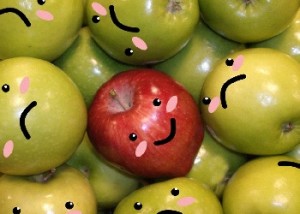 Prolific writer and French philosopher Voltaire said it best about originality; that ?[it] is nothing but judicious imitation.? This quote comes to mind whenever a person critiques K-pop, bemoaning that it lacks creativity, substance, and above all, originality.
Prolific writer and French philosopher Voltaire said it best about originality; that ?[it] is nothing but judicious imitation.? This quote comes to mind whenever a person critiques K-pop, bemoaning that it lacks creativity, substance, and above all, originality.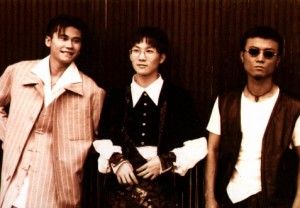 a new genre of music. However, the latter acts managed to create something different and new out of their music genres they were influenced by, while the only difference K-pop currently has made to its Western influence is the fact that it is in Korean. However, Seo Taji took a step further by eliminating the live music factor of? Korean music, by creating pre-recorded music which was much more accessible, a tool commonplace in Western music. Manufactured music soon become the norm and with the inclusion of teen idols, entertainment companies could now make music and sell it as a commodity, through Seo Taji?s method, which can be easily replicated through the use of technology. However, this would be that the Korean music scene would be predominantly void of original material, coming for the minds of an artist or a collaboration of artists.
a new genre of music. However, the latter acts managed to create something different and new out of their music genres they were influenced by, while the only difference K-pop currently has made to its Western influence is the fact that it is in Korean. However, Seo Taji took a step further by eliminating the live music factor of? Korean music, by creating pre-recorded music which was much more accessible, a tool commonplace in Western music. Manufactured music soon become the norm and with the inclusion of teen idols, entertainment companies could now make music and sell it as a commodity, through Seo Taji?s method, which can be easily replicated through the use of technology. However, this would be that the Korean music scene would be predominantly void of original material, coming for the minds of an artist or a collaboration of artists.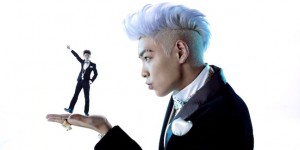 hat is easily consumable, in order to reach as much consumers as possible.
hat is easily consumable, in order to reach as much consumers as possible.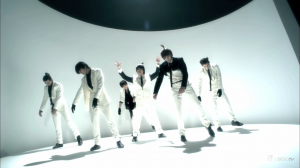 company, in order to guarantee that their material is favourable to the markets. However, it seems like the material that is written or composed by idols seems more of a marketing ploy than giving an idol creative freedom. A song increases in relatability when one?s favourite idol is attached to it. But if it?s such a great marketing tool, why don?t more entertainment companies use it? Perhaps, it is because it?s still a risk to allow for an idol to have creative control over a song, a song that will cost a lot of money to produce. Granted, there have been a lot of songs created by idols that have been a great success, such as ?Lies? and ?Haru Haru? by G-Dragon, but these idols are not professionals; they were not taught to become composers or writers. Their main purpose is to entertain, and the vast majority were hired because they had a palatable talent, from looking good to singing well, which is a lot easier to maintain and nurture than creating the next great composer and writer. In short, it is much more cost-effective to feed idols manufactured songs, made by professionals, than to allow them to create songs on their own.
company, in order to guarantee that their material is favourable to the markets. However, it seems like the material that is written or composed by idols seems more of a marketing ploy than giving an idol creative freedom. A song increases in relatability when one?s favourite idol is attached to it. But if it?s such a great marketing tool, why don?t more entertainment companies use it? Perhaps, it is because it?s still a risk to allow for an idol to have creative control over a song, a song that will cost a lot of money to produce. Granted, there have been a lot of songs created by idols that have been a great success, such as ?Lies? and ?Haru Haru? by G-Dragon, but these idols are not professionals; they were not taught to become composers or writers. Their main purpose is to entertain, and the vast majority were hired because they had a palatable talent, from looking good to singing well, which is a lot easier to maintain and nurture than creating the next great composer and writer. In short, it is much more cost-effective to feed idols manufactured songs, made by professionals, than to allow them to create songs on their own.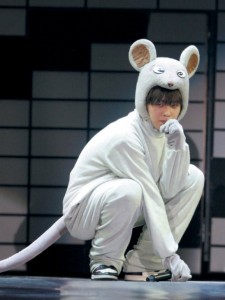 Returning back to Voltaire?s quote, is there a real thing as originality? If you have enough time on your hands, you could practically link any style of music to another. People gain their inspiration from many places, from different art forms or mediums. I think that the main reason why people accuse K-pop of being unoriginal and lacking in substance is because it is created out of the petri dish that is an entertainment company, and not the blood, sweat, and tears of a single artist. The latter causes a lack of connection between fans and the artists. Behind every idol is an entertainment company, monitoring every move they make. So in reality, we are only getting a false representation, or persona of the idol. Creating original music allows listeners to get a chance to see into the minds of the songwriter and composer, regardless if it?s a good or bad song. You can?t relate to an idol because they are wearing a mask over their true self, so they can appeal to the general public. Even in shows like Healing Camp or shows where idols reveal things about themselves, cannot be taken heart because of the scripted nature of these shows. Everything is carefully planned to the tee in K-pop, and nothing is truly real. No idol can truly be themselves, which is why K-pop is considered lacking of creativity and originality. Being original is being true to oneself and expressing oneself. Even when idols dress up outfits that look individualistic, like G-Dragon for instance, it?s basically a gimmick to intrigue K-pop fans. If the vast majority of K-pop fans disliked T.O.P.?s toothpaste hair, I doubt that YG would let him keep his hair that colour for very long.
Returning back to Voltaire?s quote, is there a real thing as originality? If you have enough time on your hands, you could practically link any style of music to another. People gain their inspiration from many places, from different art forms or mediums. I think that the main reason why people accuse K-pop of being unoriginal and lacking in substance is because it is created out of the petri dish that is an entertainment company, and not the blood, sweat, and tears of a single artist. The latter causes a lack of connection between fans and the artists. Behind every idol is an entertainment company, monitoring every move they make. So in reality, we are only getting a false representation, or persona of the idol. Creating original music allows listeners to get a chance to see into the minds of the songwriter and composer, regardless if it?s a good or bad song. You can?t relate to an idol because they are wearing a mask over their true self, so they can appeal to the general public. Even in shows like Healing Camp or shows where idols reveal things about themselves, cannot be taken heart because of the scripted nature of these shows. Everything is carefully planned to the tee in K-pop, and nothing is truly real. No idol can truly be themselves, which is why K-pop is considered lacking of creativity and originality. Being original is being true to oneself and expressing oneself. Even when idols dress up outfits that look individualistic, like G-Dragon for instance, it?s basically a gimmick to intrigue K-pop fans. If the vast majority of K-pop fans disliked T.O.P.?s toothpaste hair, I doubt that YG would let him keep his hair that colour for very long.